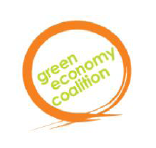The Green Economy Coalition (GEC) has published a paper titled “Surveying the ‘Green Economy' and ‘Green Growth' Landscape,” which examines: actors currently working on the green economy issue; the emerging trends and challenges; and what these mean for stakeholders more broadly.
 13 September 2012: The Green Economy Coalition (GEC) has published a paper titled “Surveying the ‘Green Economy’ and ‘Green Growth’ Landscape,” examining the green economy issue in the post-UN Conference on Sustainable Development (UNCSD, or Rio+20) context. The paper is intended as a working draft for consultation, and is open to comments and feedback from readers.
13 September 2012: The Green Economy Coalition (GEC) has published a paper titled “Surveying the ‘Green Economy’ and ‘Green Growth’ Landscape,” examining the green economy issue in the post-UN Conference on Sustainable Development (UNCSD, or Rio+20) context. The paper is intended as a working draft for consultation, and is open to comments and feedback from readers.
The draft examines: actors currently working on the green economy issue; emerging trends and challenges; and what these mean for stakeholders more broadly. It highlights activities being undertaken by both UN and non-UN actors, such as: the Global Green Growth Institute’s (GGGI) work with developing countries on green growth planning; the World Bank’s global partnership for Wealth Accounting and the Valuation of Ecosystem Services (WAVES); the commitment by multilateral development banks to support the transition to green growth; and the UN Environment Programme’s (UNEP) expansion of its Green Economy Initiative. It also outlines activities of various governments on green growth, identifying Denmark, Germany, Mexico and the Republic of Korea as “green growth agenda front-runners.”
The paper also summarizes the views of the green economy concept by some civil society groups, and the private sector. It highlights the need for multi-stakeholder collaboration, and calls on coalitions and alliances to use their collective networks, influence and expertise to complement and challenge the emerging green growth and green economy agendas. It suggests that the GEC should use its own global network to: ensure multi-stakeholder participation in the generation of green economy national plans and processes; challenge the analytical frameworks emerging from various institutions; expand the knowledge sharing platform; and influence international processes. [Publication: Surveying the ‘Green Economy’ and ‘Green Growth’ Landscape]